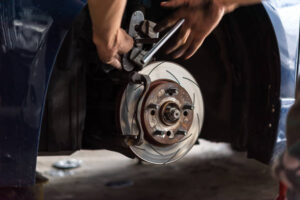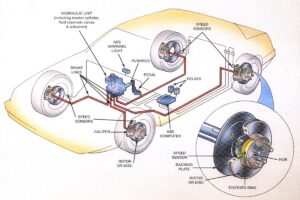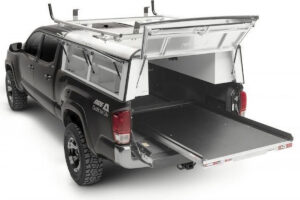
Ensuring Safe Braking: A Guide to Brake Preventive Maintenance
A Guide to Brake
Home » Will Bigger Tires Affect My Vehicle’s ABS?
We’re here to tell you that your ABS system will be fine (for the most part — read on to find out more) if you upgrade to bigger tires. However, you would need to upgrade other parts along with your tires to keep your truck’s braking system performance optimal. First, let’s talk about what might happen to your ABS system after you upgrade to bigger tires.
ABS systems vary a lot in sophistication, but they all rely on the same basic concept. The concept is that they measure and compare the rotational speed of each wheel to the other wheels. If one wheel is rotating more slowly than the others, the ABS system takes this as an indication that a skid is beginning. The ABS system then starts to pulse the brakes rapidly until the wheels are all rotating at the same speed. Modern ABS systems can pulse the brakes up to 15 times per second, which is much more quickly than a human could accomplish.
Depending on how old your vehicle is, and how sophisticated it’s ABS management system is, you may be able to re-program it’s computer when you put on larger tires. For instance, every Jeep Wrangler since 2007 can be re-progammed to tell the computer that you put bigger tires on the Jeep. This can be done at the dealer, or with an after market programmer.
But, even if your truck can’t be re-programmed, the ABS should still work as intended. In most cases, the ECU will automatically recalibrate to accommodate bigger tires. We recommend testing your ABS system after upgrading to bigger tires.
For an ABS system to work effectively, your braking system needs to be able to keep up with the bigger tires. You can start by upgrading to bigger brake pads designed to handle bigger tires.
At Beefed Up Brakes, we offer high quality trail rated and heavy duty brake pads. Trail rated brake pads are ideal for off-road and daily driving. They are for people who drive a “normally” weight vehicle to and from the trail, and also on the trail. If you have a heavy vehicle that hauls a lot of cargo, or you tow with it, you might want to go with heavy duty brake pads.
Vehicles on a trail generate low brake pad temperatures because they are not going very fast. Daily driving also does not generate high pad temperatures, because the pads don’t work too hard to stop the vehicle, and they usually get to cool off between stops. But, our trail rated pads are also designed to have the right amount of friction needed to stop larger wheels and tires. Larger wheels and tires have more leverage on the brakes than stock tires do, so they need a pad that is designed for this situation.
Heavy duty pads are designed to work well at higher pad temperatures. If you’ve built your Jeep or Tacoma and added 500-1000 lbs to it, it will generate more pad heat when stopping. The same thing happens if you are towing. Unless the pad compound is designed to work well at high temps, you will have brake fade.
In a nutshell, a good set of upgraded brake pads can accommodate the demands caused by larger tires or a heavier vehicle.
If just upgrading your brake pads doesn’t do the trick, then the next best thing is to get a big brake kit with:
Once you have upgraded brakes (whether it’s just the brake pads or a full brake kit), you’ll have the peace of mind that your truck’s stopping power has been restored.


